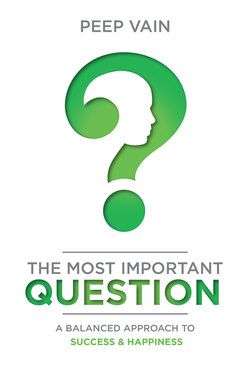Читать книгу The Most Important Question - Peep Vain - Страница 17
На сайте Литреса книга снята с продажи.
Broken illusions and forgotten dreams
ОглавлениеWhat do I mean by dreaming? In its simplest form, dreaming is thinking about things. Or thinking about future possibilities. About different scenarios for you and your life. What are your recurrent thoughts? As you do your morning run, work in the garden or sit alone there at your kitchen table with a cup of coffee, what thoughts keep coming back to you? What images? What ideas? What are the things you keep telling yourself you’d do if you had more time or more money or both? What are you longing for? What is missing from your life? Or, if you’re one of the lucky few for whom everything seems just right, then what could enable you to have even more fun than you’re having right now?
But what if you are one of those who simply does not dream? If you are one of those highly left-brain, pragmatic rationalists, who will not indulge in such impracticality? Certainly as we grow older, many of us stop dreaming at one point or another. But we all have dreamed before. When we were kids, for sure. Before we get deeper into dreaming, it’s important to consider the possibility of what limits our dreams, or even keeps us from dreaming altogether.
Everybody has heard of a mid-life crisis, which I personally prefer to term a mid-life transition. All people go through it, some more consciously than others. And while at it, many also experience disillusionment. It usually happens around the age of 40, but it can also happen much earlier. Whatever the age (but usually as the second half of one’s life is starting), all of us have to make peace with the fact that some of our childhood dreams will never be fulfilled.
In my seminars, I have seen over and over again that many people toss the entire concept of dreaming out the window. They hunker down like an ox and start pulling the plow. Sometimes I joke that the Estonian constitution has a paragraph in it that says that after age 20 you can dream half as much and then after 40 you cannot dream at all.
In dreaming there is a lot of hidden unconscious negativity. A lot of dreams don’t happen for a lot of people, so they don’t bother to dream. A dream not coming true brings disappointment. How many times can you endure this? It’s like reliving our teenage years of unrequited love. You want the girl (or boy), you dream about her, you visualize walking hand in hand with her, and you finally (maybe) work up the courage to talk to her, and you realize she does not entertain even remotely the same idea. In fact, she doesn’t even know your name. How many times can we go through this process of love and agony?
In my late teens, early twenties, I went through a much more elaborate process of trying to transcend from friendship to intimacy with three different young women (not all at the same time). Each of those relationships lasted a few years. Had I let the disappointments get the better part of me, I might as well have ended up as a monk. You see, in the end, many of us protect ourselves by not dreaming. We don’t fly too high. We don’t have silly thoughts. We fly low to the ground. And we build up a life.
Even if you gave up dreaming long ago, pretend for at least as long as you’re reading this book that you didn’t give it up. Just have fun and play along. Hide the book under your mattress if you want. Nobody but you needs to know.
